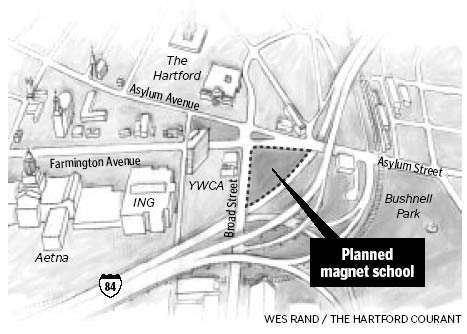 |
 |
|||
|
||||
| Web Sites, Documents and Articles >> Hartford Courant News Articles > | ||
|
Hartford Defiance Could Be Costly As State Balks, Perez's School Plan Proceeds January 31, 2007 Hartford Mayor Eddie A. Perez landed at the center of another firestorm Tuesday as the city's decision to begin construction of a magnet school on a disputed site angered lawmakers and state officials who oppose the plan.
The city's decision to push ahead with construction despite continuing questions over the status of the land was seen by some as an act of defiance. The move means Hartford could lose the land, which is at the corner of Farmington Avenue and Broad Street, and could be left paying the tab alone for the $38 million business and technology magnet school. The city has broken ground at the site; state officials have said they will not provide funding without the proper authorizations in place. Perez, who also is chairman of the school building committee and the school board, could not be reached for comment Tuesday. His chief of staff, Matthew J. Hennessy, said he's confident the state will pay for the school because it is an inter-district magnet being built in compliance with a court settlement to desegregate Hartford's schools in the Sheff vs. O'Neill case. "It's going to be worked out with the state one way or another," Hennesy said. After failing to win legislative backing for his school construction plan last year, Perez said recently that he didn't think he needed the General Assembly's OK to move ahead. The state has deeded the land to the city on the condition it be used for one of three purposes: a park, a public safety complex or economic development. In a letter to state education officials, Perez said the Pathways to Technology magnet school constitutes economic development because the students it trains will help Connecticut businesses compete in the global economy. But Robert Genuario, secretary of the state Office of Policy and Management, last week asked Attorney General Richard Blumenthal for an opinion on whether the school does, in fact, qualify as economic development under the terms of the deed. Blumenthal said Tuesday that he has not reached a decision yet, but that the matter is a priority. "There is a common interest in resolving this issue as quickly as possible. It is a Sheff school and it is mandated by the settlement," he said. If Blumenthal decides the magnet school doesn't qualify as economic development, the site work could constitute a violation of the deed restrictions and could trigger a clause that returns ownership of the land to the state. Feltman said he already is talking to state officials about invoking the "reverter clause" in the deed and taking the land back from Hartford. Hartford also stands to lose its 95 percent state reimbursement for the school and find itself on the hook for the entire $38 million cost. As it is, the state Department of Education is refusing to reimburse the city for the $2 million it spent on design costs and environmental testing until the city identifies a "usable site" for the school. "It's on their dime," said Tom Murphy, spokesman for the education department. Gov. M. Jodi Rell entered the fray Tuesday, writing a letter to Blumenthal expressing her opposition to building the school on Broad Street. "Without question, the proposal stretches well beyond the definition of that restriction [for economic development] and I am adamantly opposed to the use of the site for a school," Rell wrote. "While I have always been very supportive of efforts to expand magnet school opportunities in Hartford and our other cities, I believe this site poses significant and troubling safety and traffic concerns and is not at all an appropriate location for a school. In fact, its potential risk to students, teachers and staff alike and its potential to aggravate already overburdened traffic patterns make it wholly unsuitable for an institution of learning." "No one knows how long that will take," said Carl Nasto, Hartford's deputy corporation counsel. "We have a construction schedule to keep. ... And time costs money with these construction contracts. The cost of steel goes up. The cost of fuel goes up. The cost of supplies goes up. The longer we wait, the more expensive it gets. This has taken four years." "In state redevelopment statutes, schools are under the definition of redevelopment plans," Nasto said. "And economic development is a project that creates jobs and revitalizes urban areas. The school is doing both of those things. It is a job-creating machine." Pathways to Technology has moved twice since it began as an academy within Hartford Public High School. When renovations started at Hartford Public years ago, Pathways, which converted into a Sheff-related magnet school, moved to spare classrooms in the then-new Metropolitan Learning Center, a magnet school in Bloomfield. When the learning center needed the space, Pathways moved again to rented space in a commercial building in Windsor. State Rep. Andrew Fleischmann, D-West Hartford, House chairman of the education committee, said Hartford officials need to pull together for the good of the city's children. "It's evident that the city is divided against itself," he said. "I'm hopeful the city of Hartford can work out its internal disagreements and get these kids the school that they deserve."
|
||
| Last update:
September 25, 2012 |
|
||
|

